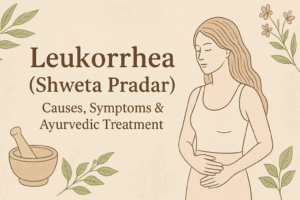Introduction
Leukorrhea (also spelled Leucorrhoea) refers to a white or yellowish vaginal discharge that occurs in women of all ages. A mild discharge is normal and helps in cleaning and lubricating the reproductive tract. However, when the discharge becomes excessive, thick, or foul-smelling, it may indicate infection or hormonal imbalance.
In Ayurveda, this condition is called “Shweta Pradar” — Shweta meaning white and Pradar meaning discharge. Ayurveda sees it not merely as a local infection, but as a systemic imbalance caused by weakened reproductive tissues and vitiated doshas.

💠 Understanding Leukorrhea in Modern Medicine
In modern medical science, Leukorrhea may result from:
Vaginal or cervical infections (bacterial, fungal, or protozoal)
Hormonal fluctuations during puberty, pregnancy, or menopause
Poor genital hygiene
Use of unhygienic menstrual products
Stress and nutritional deficiencies
If untreated, it may cause irritation, fatigue, or pelvic inflammation.
🌿 Ayurvedic Viewpoint on Shweta Pradar
According to Ayurveda, Kapha dosha vitiation along with Rasa dhatu (body fluids) weakness is the main cause of excessive discharge.
A sedentary lifestyle, excessive consumption of oily and heavy food, emotional stress, and lack of hygiene further aggravate Kapha and lead to discharge.
“प्रकृतिविशेषात् भिन्नाः मनुष्याः”
Every woman’s body constitution is unique; hence treatment must be individualized.
⚕️ Common Symptoms of Leukorrhea
White or yellowish discharge
Foul odor
Itching or burning sensation in the genital area
Lower abdominal or back pain
General weakness or fatigue
Loss of appetite or indigestion
🌸 Ayurvedic Treatment for Leukorrhea (Shweta Pradar)
Ayurvedic management aims to restore doshic balance, strengthen the reproductive system, and improve digestion (Agni). Treatment is holistic, combining diet, lifestyle, and herbal remedies.
🔹 1. Diet Recommendations (Pathya-Apathya)
Eat:
Warm, light, and freshly cooked food
Barley (Yava), rice, green leafy vegetables
Buttermilk with roasted cumin and rock salt
Fruits like amla, pomegranate, and guava
Triphala water or decoction
Avoid:
Oily, spicy, and heavy food
Junk food and cold beverages
Excessive dairy and sugar
🔹 2. Lifestyle Guidelines
Maintain personal hygiene
Wear cotton undergarments and avoid tight clothes
Get adequate sleep and manage stress
Avoid long sitting hours; include yoga and walking
Practice Pranayama and Surya Namaskar for hormonal balance
🔹 3. Ayurvedic Herbs & Formulations
(To be taken under supervision of a qualified Ayurvedic physician)
| Herb / Formulation | Benefits |
|---|---|
| Ashoka (Saraca indica) | Regulates menstrual cycle, tones uterus |
| Lodhra (Symplocos racemosa) | Reduces discharge and inflammation |
| Shatavari (Asparagus racemosus) | Nourishes reproductive system |
| Punarnava (Boerhavia diffusa) | Reduces swelling and supports detox |
| Triphala | Improves digestion and clears toxins |
| Panchavalkala decoction | Used for Yoni Prakshalana (vaginal wash) |
🧘♀️ Home Remedies for Mild Leukorrhea
Fenugreek seeds water: Boil 1 tsp in 2 cups of water; drink once cooled.
Amla (Indian gooseberry): Acts as a natural cleanser and rejuvenator.
Banana + Ghee: Helps strengthen tissues and balance Vata-Pitta.
Triphala powder (½ tsp) with warm water at bedtime improves digestion and reduces discharge.
(Always confirm with your doctor before starting remedies.)
⚖️ Modern Diagnostic & Treatment Approach
A gynecologist may recommend:
Vaginal swab test or culture to identify infection
pH testing and microscopic examination
Antibiotics, antifungals, or probiotics as required
Combining modern diagnosis with Ayurvedic management provides the best outcome — addressing both the root cause and symptom relief.
💫 Preventive Measures
Maintain daily hygiene
Change sanitary products regularly
Stay hydrated
Avoid using chemical sprays or douches
Eat a nutrient-rich, balanced diet
Manage emotional stress
🌼 Conclusion
Leukorrhea or Shweta Pradar is common but manageable. Ayurveda teaches that every symptom is a signal of imbalance, not just a local issue.
By adopting the right diet, lifestyle, and herbal support, women can restore harmony and maintain long-term reproductive wellness.
“Nourish your body, calm your mind, and balance your doshas — that’s true healing.”
Keywords
Leukorrhea treatment in Ayurveda | Shweta Pradar Ayurvedic remedies | White discharge causes and cure | Ayurvedic medicine for vaginal discharge | Natural remedies for Leukorrhea | Ayurveda for women’s health | Ayurvedic approach to Shweta Pradar


